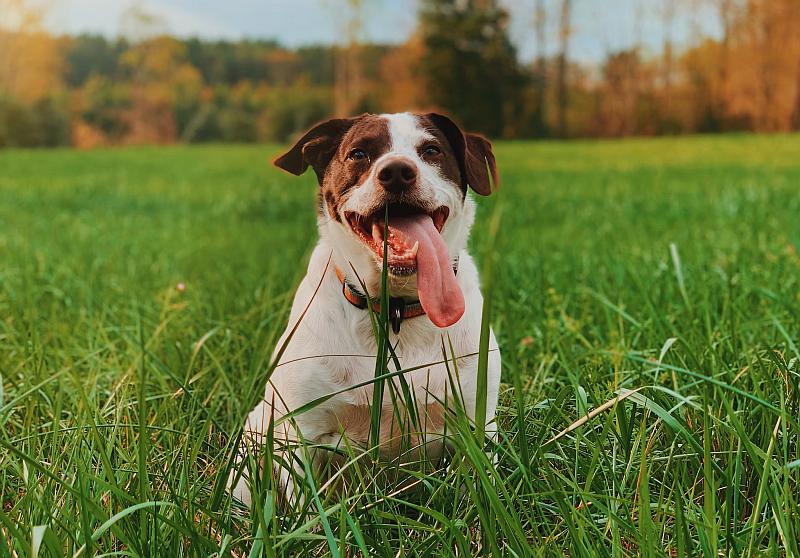Many dog owners wonder why their pets nibble on grass and then vomit. Is this behavior natural, or could it indicate some kind of health problem? In this article we will try to answer these questions.
Why do dogs eat grass?
As carnivores, dogs often astonish their handlers when they start eating grass. Although their digestive systems are not designed to digest plants, many dogs seem to derive some satisfaction from eating grass. But why does this happen?
Eating grass and sticks as a way to cleanse the stomach: One theory is that dogs eat grass to cleanse their stomachs of lingering digestive contents. Grass can act as an irritant to the gastric mucosa, leading to vomiting, which allows the dog to get rid of unwanted substances or lingering food.
Reaction to indigestion or health problems: Some dogs may eat grass when they feel nauseous due to indigestion, food poisoning or liver or pancreas problems. In such cases, eating grass is a natural way to induce vomiting, which helps cleanse the digestive system.
Behavioral and health causes: dogs eating grass can also be a symptom of various health and behavioral problems. For example, dogs that frequently eat grass may suffer from heartburn or other stomach ailments. In some cases, it can also be a way to cope with stress or boredom.
Instinct and taste preference: According to some experts, dogs eat grass because they simply like it. They may like its taste or texture. In addition, eating grass can be a source of fiber for dogs, which is essential for the proper functioning of their digestive system.
It’s important to remember that while eating grass is often harmless for your dog, it’s always a good idea to observe your dog’s behavior and consult your vet if you have any concerns. Especially if your dog eats a lot of grass and vomits frequently, this could be a sign of a more serious health problem.
Stomach problems and dog eating grass
Many dog owners wonder why their four-legged friends nibble on grass, especially when vomiting occurs after eating it. Is this merely innocent behavior, or does it indicate deeper health problems?
Gastrointestinal complaints: One of the most common reasons dogs eat grass and sticks is for gastrointestinal complaints. Grass can act as an irritant to the mucous membrane of the stomach, leading to vomiting. In this way, the dog tries to get rid of something that bothers his stomach. This can be related to undigested food, excess bile or the presence of parasites.
Indigestionresponse: dogs that suffer from indigestion may instinctively seek out grass. It is believed that the chemical components in grass help neutralize excess stomach acids, which can bring relief to the dog. However, if a dog regularly eats grass and vomits, it is worth consulting a veterinarian to rule out more serious health problems.

Bile production disorders: obsessive grass eating can be a symptom of gastrointestinal disorders, such as problems with bile production. Bile is essential for digesting fats, and an excess or deficiency can lead to indigestion and vomiting.
Response to stress or boredom: In some cases, dogs may eat grass as a way to cope with stress or boredom. This behavior can also be a form of self-medication when a dog is experiencing stomach discomfort.
It is important to remember that eating grass by itself is not harmful to the dog. However, if it is combined with other symptoms, such as lethargy, diarrhea or loss of appetite, it may indicate a more serious health problem that requires veterinary intervention.
Is eating grass dangerous for your dog?
Many dog owners notice that their pets are fond of nibbling on grass during walks or in the garden. While this is a common behavior, it raises the question of whether it is safe for our pets.
Natural behavior: grass-eating is common not only in domestic dogs, but also in their wild cousins. Wolves, foxes or dingo dogs also like to vary their diet with grass. Therefore, it can be assumed that this is a natural instinct and not necessarily a sign of a health problem.
Grass as a source of fiber: Grass can be a source of antioxidants, minerals and fiber. Fiber is important for the proper functioning of a dog’s digestive system, helps with digestion, and can have a soothing effect on certain stomach ailments.
Possible risks: Although eating grass by itself is not usually harmful to a dog, there are some risks. Dogs can accidentally ingest grass contaminated with pesticides, fertilizers or other chemicals, which can lead to poisoning. In addition, grass can be a source of parasites that can be transferred to the dog.
Response to stomach discomfort: Some dogs may eat grass in response to stomach discomfort. Grass acts as an irritant to the gastric mucosa, which can lead to vomiting. In this way, the dog may be trying to get rid of something that bothers his stomach.
In conclusion, eating grass by your dog is not usually dangerous, but it is worth being aware of the potential dangers. It’s always a good idea to observe your dog’s behavior and if in doubt, consult your vet.
How to prevent your dog from eating grass?
Many dog owners wonder how to prevent their pets from nibbling on grass. While this is a natural behavior, it can be undesirable, especially if the grass is treated with chemicals or if the dog vomits after eating it.
Understanding the causes: The first step in preventing your dog from eating grass is to understand why he does it. Is it a reaction to stomach discomfort? Or is it a way to cope with stress or boredom? Understanding the cause will help you develop effective preventive strategies.
Enrich your diet: If you suspect your dog is eating grass in search of fiber, consider enriching his diet with fiber-rich foods, such as vegetables or special foods.
Creating an alternative: You can provide your dog with an alternative source of “green” food, such as special dog grasses available at pet stores. These are safe for dogs and can satisfy their need to nibble on grass.
Watch out for chemicals: If your garden is treated with pesticides or fertilizers, make sure your dog does not have access to them for a reasonable amount of time after they are applied. These chemicals can be harmful to your dog.
Keepyour dog occupied: If eating grass is your dog’s way of coping with boredom, it’s a good idea to provide your dog with more activity. Interactive toys, longer walks or training sessions can help distract your dog from the grass.
It’s worth remembering that a dog eating grass is not usually a health problem, but if you have doubts about the causes of this behavior or if your dog vomits frequently after eating grass, it’s worth consulting a vet.
Summary – why do dogs eat grass and what to do about it?
Eating grass by dogs is a natural behavior that has many potential causes. It could be a reaction to stomach discomfort, a need to supplement fiber in the diet, a way to cope with stress or boredom, or even an instinctive attempt to get rid of parasites. Although eating grass itself is not usually harmful to your dog, there are some risks, such as ingesting grass contaminated with chemicals or parasites.
If you want to prevent your dog from eating grass, it’s a good idea to understand the cause of this behavior. You can enrich your dog’s diet with fiber-rich foods, provide alternative sources of “green” food, avoid treating the garden with chemicals, or provide your dog with more activity. If you have doubts about your dog’s reasons for eating grass or are concerned about your dog’s health, it’s always a good idea to consult a veterinarian.






